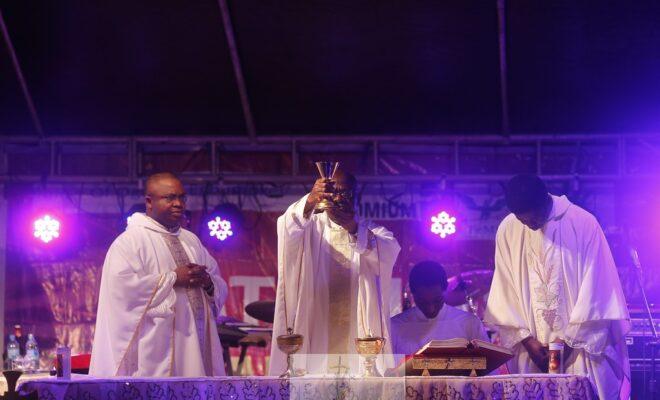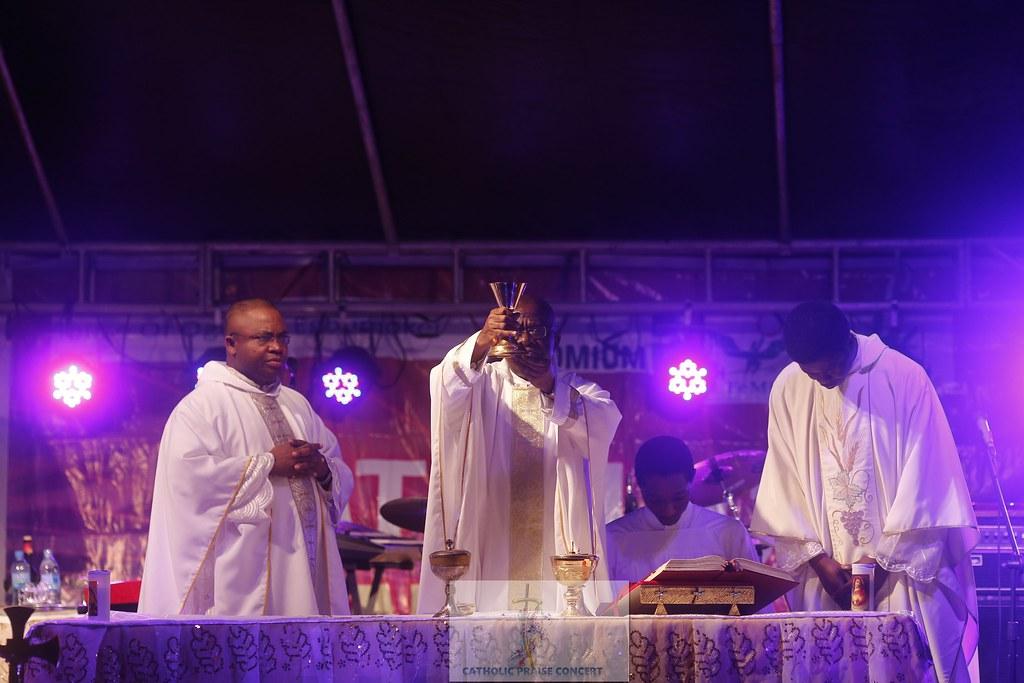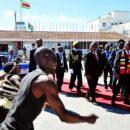COVID-19: There’s one thing Nigeria’s religious rockstars can do to help

Nigeria’s faith leaders are immensely influential and often have millions of followers. If they want to help, they should stay out of the way.

Several religious leaders in Nigeria have congregations of millions of people. Credit: Peter Egbumokei.
Read all our COVID-19 coverage
Earlier this month, one of Nigeria’s most influential pastors caused a huge storm. In a broadcast that shocked the nation, Chris Oyakhilome claimed that COVID-19 is linked to 5G technology and part of a plot to enslave Africans.
The backlash to his endorsement of this dangerous conspiracy theory was swift, and for good reason. Oyakhilome leads Christ Embassy, a 30-year-old ministry with branches on six continents and an estimated congregation of 13 million people. Across his social platforms, the pastor himself has 4 million followers who help propagate his views.
While many in Oyakhilome’s congregation supported his claims, the vast majority of the public rejected his wild theory. Pastors Poju Oyemade and Sam Adeyemi (who also lead large congregations) held broadcasts on Instagram live in which they spoke of previous pandemics and gently guided Oyakhilome towards a retraction. “There are opportunities in every crisis, and it is the leader’s duty to see the opportunities and not to project fear on his/her followers,” said Oyemade.
After initial denials and rebuttals, Oyakhilome eventually bowed to the public pressure and disavowed his earlier statement. It was a small but significant victory in a big war.
Religious sway on COVID-19
The influence religious leaders wield over their congregations in Nigeria is immense. In normal times, this power is reinforced through performative rituals like weekly masses and congregational prayers. But with auditoriums forced to close, some religious leaders are now turning to outlandish theories to reassert their influence.
Oyakhilome is not the one. Apostle Johnson Suleman, a controversial Pentecostal pastor recently caught up in an adultery scandal, has claimed that the pandemic is part of an international conspiracy that includes the pope. Islamic leaders have also defied the government by continuing to hold religious lectures and mass prayers.
This is not a benign threat. In a deeply religious nation, these leaders exert a huge sway over politicians, government officials, and large swathes of both the middle class and mass public. If their small steps are allowed to grow into an actual movement, lives will literally be at risk. Over Easter, some state governments yielded to pressure to allow churches to open. Despite cases continuing to rise sharply, there is also a whisper campaign ongoing aimed at pushing the government to reopen the country during Ramadan.
A week or so ago, Nigeria’s most influential pastor Enoch Adeboye added his voice to discussions about the country’s COVID-19 response. The spiritual head of the Redeemed Christian Church of God, which counts the Vice President among its devotees, emerged with a prophecy. He said that life would begin to return to normal within two weeks and called on fellow religious leaders to be involved in the government’s efforts to contain the virus. Pastor Adeboye has a track record of responsible public interventions, but these comments must be read as an escalation of more surreptitious campaigns to sway government policy.
Stay in your lane
We should all be worried when religious leaders wade into complex matters that even credentialed experts are cautious to comment on.
I am a Christian, one for whom the faith has been deeply redemptive. I have also spoken on pulpits to thousands of believers and learn daily from several pastors in Nigeria. But on this matter, it is clear what my leaders in the faith, and spiritual leaders across the country, need to do: Stay out of the way of the scientists helping to keep us all safe.
At a time of great global uncertainty, it is unhelpful for people to speak with authority on subjects of which they know very little. It is a time for a strict sense of responsibility, especially by those who have power or influence. Bankers should focus on the free flow of monies; entertainers should focus on keeping people happy; developers should focus on projects that can accelerate solutions; and religious leaders should focus on providing meaning, comfort and doctrine for the times.
Thankfully, there is already a powerful model for this. Responding to the promise of the governor of Rivers state to open up the churches for Easter communion, the Port Harcourt diocese of the Catholic Church swiftly said no. Adhering to the clear scientific advice, Bishop Camillus Etokudoh wrote: “Having prayerfully considered the implications of the risks to our expected crowded congregation on normal Easter Sunday celebrations, we hereby request you… continue to keep to the…directives/guidelines for the celebrations of Holy Week.”
The Sultan of Sokoto, Alhaji Sa’ad Abubakar III, similarly asked Nigeria’s Muslims not to congregate for prayers during Ramadan.
Saying no to the temptation to exercise power for one’s own benefit will require enormous discipline from individuals used to throwing their weight around and getting what they want. But at this moment, and for the foreseeable future, that is the only responsible thing to do.
“Is there no balm in Gilead?” the Hebrew Bible asks in Jeremiah chapter 8, verse 22. “Is there no physician there? Why then is there no recovery for the health of the daughter of my people?”
We are lucky. As Nigeria tackles the coronavirus pandemic, there are physicians here. The role of religious leaders then is to support them from the sidelines and let them do their jobs.






chloroquine malaria https://chloroquineorigin.com/# plaquenil sulfate